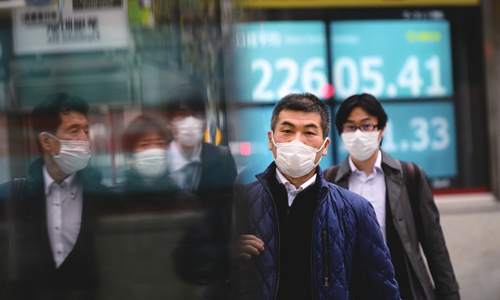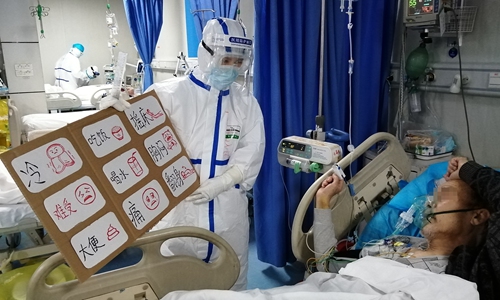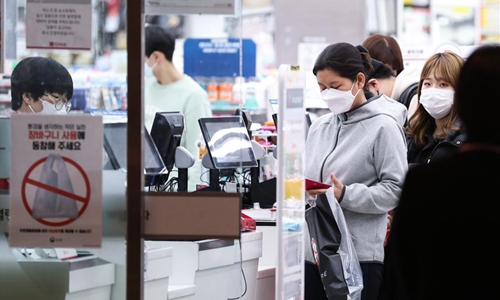Cities tighten measures against import virus spread
Strict restrictions reflect pragmatic, responsible responses to epidemic

Pedestrians wear face masks amid concerns over the spread of the COVID-19 novel coronavirus, in Tokyo on Tuesday. In Japan, the confirmed number has topped 861, including passengers previously quarantined at the Diamond Princess cruise ship. Photo: AFP
Several Chinese cities raised their alert and implemented strict entry measures on Tuesday by asking all foreign visitors to undergo quarantine amid rising fears of the fast-spreading outbreak of the novel coronavirus (COVID-19) in Japan and South Korea, aiming to prevent overseas cases of infection.Such restrictions, in sharp contrast to the generous help and goodwill offered by the two neighboring countries at the early stage of the outbreak in Wuhan, sparked online discussions as some questioned whether it shows China's selfish and ingratitude mind-set as fears grow over the spreading virus.
However, analysts said this is China's pragmatic, scientific and responsible responses to the epidemic as the classic quarantine measures the country has adopted proved to be the only available way that worked out. If the rebound of infections occurs, the country's previous progress would end in vain, which will also drag the global epidemic combat into a deadlock.
Qingdao, a highly popular destination for South Koreans in East China's Shandong Province, is adopting a stricter epidemic prevention policy amid the COVID-19. It has asked all foreign visitors to either undergo self-quarantine or stay in designated hotels, as infection numbers in South Korea soared tenfold in less than a week.
Local authorities began on Monday to assign vehicles to pick up all foreign visitors arriving in Qingdao and send them to their homes for a 14-day mandatory quarantine. Foreigners coming for short-term visit or business travel will be sent to designated hotels, the local government said.

Chen Yuxi (left), a nurse from East China's Jiangxi Province who is supporting the battle against the epidemic in Wuhan, shows a paperboard with icons indicating eating, drinking and pain, to a critical patient on Monday. Chen made the board to help communicate with patients who have difficulty expressing their needs. Photo: cnsphoto
Other cities in the province, including Weihai and Yantai, took similar moves. Weihai, the closest city in the country facing South Korea, imposed even stricter measures as both foreigners and Chinese who departed from either Japan or South Korea would be sent to hotels for a 14-day mandatory quarantine. Yantai, a coastal city located about 65 kilometer from Weihai, also strengthened management of entrants by requiring reports of health condition, arranging special vehicles to transfer them to designated places.
Netizens allegedly from Qingdao wrote on social media platforms that some South Koreans who arrived in Qingdao were not placed under home quarantine like the Chinese citizens were, leaving a potential loophole in epidemic control.
Some speculated that South Koreans might be flying to Qingdao to avoid the rapid infection rise in their home country. Those posts also aroused public concerns over possible overseas cases of infection.
South Korea reported an additional 144 confirmed cases of COVID-19 on Tuesday, bringing the total to 977 with 11 deaths, according to the Yonhap News Agency. The spike in infection numbers also raised concerns on looming massive infection in the country.
Japan is also on the edge of a rapid spread of the virus, as the confirmed number has now topped 861, including passengers previously quarantined at the Diamond Princess cruise ship.
South Korea and Japan have become two of the most virus-stricken countries outside of China. Some countries and regions also issued travel warnings to South Korea and Japan. The US Center for Disease Control and Prevention raised its travel advisory to South Korea to the highest level on Monday and urged against all nonessential travel to the country.
Besides Shandong, provinces in Northeast China, with a considerable ethnic Korean population, also escalated prevention and control measures. Hunchun, a city in Northeast China's Jilin and bordering North Korea, imposed a 14-day mandatory quarantine for all foreign returnees to the city. Those without the city's permanent residence will be sent to designated places for quarantine.
And Dalian, a city in Northeast China's Liaoning that hosts the annual summer Davos meeting, also took targeted measures to prevent overseas cases of infection, paying more attention to neighboring countries, the local government said on Monday. Local authorities in Shenyang, capital of Liaoning, sent out alert messages to local residents, urging them to avoid going to communities where Chinese returning from South Korea live.
Qingdao is believed to be the most favored Chinese city by South Koreans, where about 100,000 people from South Korea live, according to media reports. As a major port that is also a free trade zone in northern China, the city has been attracting investments of over 20 billion yuan ($2.84 billion) so far from South Korea with over 2,300 South Korean firms, also according to media reports. It's also widely believed that if a graduate speaks Korean, he won't have trouble finding a job in Qingdao. Major multinational companies such as LG and Sindoh are based there.
On Tuesday, relevant authorities in some Beijing districts, particularly Wangjing, the so-called "Koreatown" that is home to the capital city's largest non-Chinese community, also issued warnings to local residents to avoid going to places where large numbers of South Korean people are known to live and go, as part of the city's epidemic control measures against public gatherings.
China has made a huge sacrifice by imposing unprecedented city lockdowns and drastic restrictions on movement, which WHO experts called a "bold approach" that changed the course of the epidemic, which probably prevented hundreds of thousands of more cases of infection.
The country has seen visible progress in its fight against the disease with 24 provincial-level regions across China reporting zero new cases of COVID-19 infections on Monday. Outside of Hubei, regions reported only nine new cases of infections on Tuesday, a significant drop from previous days. Meanwhile, WHO experts mentioned that the number of coronavirus cases reported in China a day has dropped from 2,500 two weeks ago to 406 on Monday, which was about an 80 percent decline.
The deadly virus has caused 77,658 infections nationwide so far, with the death toll at 2,663. Authorities at all levels will not take any risks to see a possible rebound resulting from overseas cases of infection, analysts said.
Provinces such as Liaoning and Shandong are regions where many South Koreans and Japanese do business, study, visit relatives and temporarily settle down. "Considering the severe situation in neighboring countries, it is necessary for local authorities in these provinces to enhance preparedness, as we can't let our previous efforts end in vain," Liang Qidong, vice president of the Liaoning Academy of Social Sciences, told the Global Times on Tuesday.

Local residents wait to pay at the counter in a shop in Seoul, South Korea, Feb. 24, 2020. South Korea confirmed 231 more cases of the COVID-19 on Monday, raising the total number of infections to 833, and the death toll rose to eight. The country raised its four-tier virus alert to the highest "red" level on Sunday as the virus infections soared for the past week. Photo: Xinhua
Raise awareness
A 50-year-old man, surnamed Shim, who works in a foreign exchange company in Seoul, told the Global Times on Tuesday that his company distributed facial masks to employees on Monday and asked them to wear it before going to the office.
"But not many people are wearing masks in our office today, including me, because I think it might look a little bit overreacting. The situation is not that bad in Seoul," Shim said.
WHO Director-General Tedros Adhanom Ghebreyesus said in a Monday briefing that outside of China, there were 2,074 infection cases in 28 countries and regions with 23 deaths, and the sudden increase of cases in Italy, Iran and South Korea "are deeply concerning."
However, online video footage and media reports showed that local residents in Seoul showed up in a public rally over the weekend while the South Korean government vowed to bring in maximum measures to contain the outbreak. South Korea planned to test around 200,000 members of the Shincheonji Church, which is believed to be the ground zero of the spread in the country.
More importantly, public awareness was also urged to be raised in combating the disease not only in South Korea but also in Japan.
Nomachi Ayako, a first-year Japanese graduate studying at Shanghai International Studies University, stayed in Shanghai for the winter break and chose to continue staying there despite the virus outbreak because she feels Shanghai has taken more vigorous measures to prevent and control the epidemic than her home city Tokyo.
"My family insisted I stay in Shanghai, because the situation is more serious in Japan," she told the Global Times on Tuesday.
Ayako said some of her Japanese friends feel panic due to the great shortage of protective masks in Japan and no mandatory city lockdowns there like in China, and the pollen season is coming up, which may cause a further spread of the epidemic. Also, some of the dismissed asymptomatic people on the Diamond Princess cruise ship have started coughing and having a fever after returning home, so people are worried of being infected unintentionally by these people during their incubation period.
The Japanese Embassy in Beijing told the Global Times on Tuesday that Japanese nationals will continue to be advised to return to their homeland as soon as possible, or delay their journeys to China, preventing transmission between the countries.
Wang Cheng, a 35-year-old employee with a machinery company in Busan, South Korea, told the Global Times that few people wear masks in his company and people keep going out for group dinners as usual despite a warning from the company.
Given the severe outbreak, South Korea and Japan are expected to learn from the experiences of China in taking decisive and strict measures to fight the disease, while China will provide valuable experience and assistance to them.
"It has become a common challenge beyond borders. China, Japan and South Korea should further strengthen information sharing and cooperation in epidemic control work, as it doesn't only concern one country or the other," Liang said.